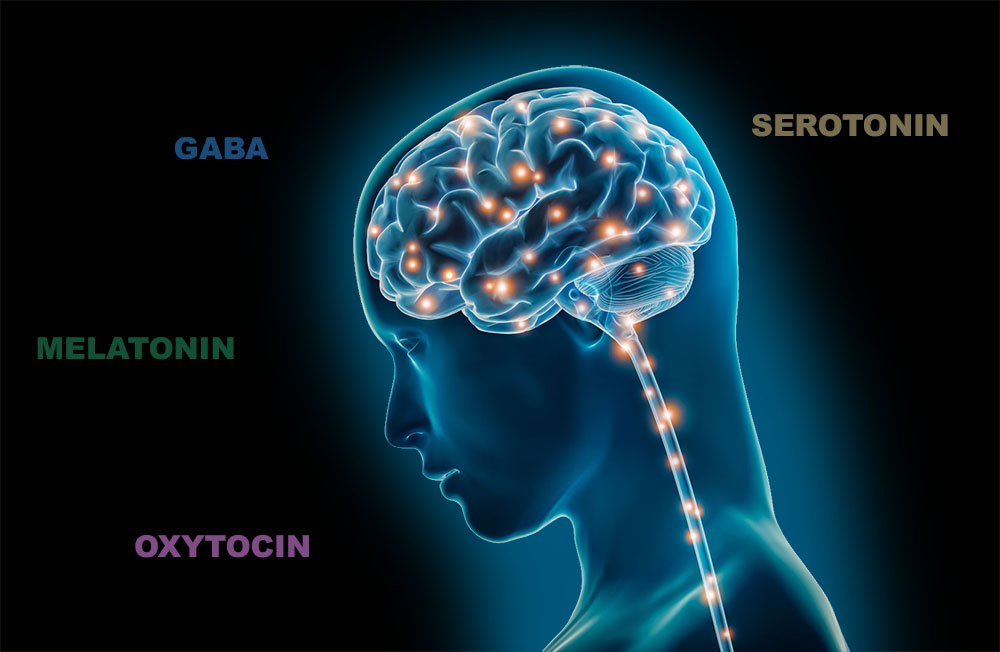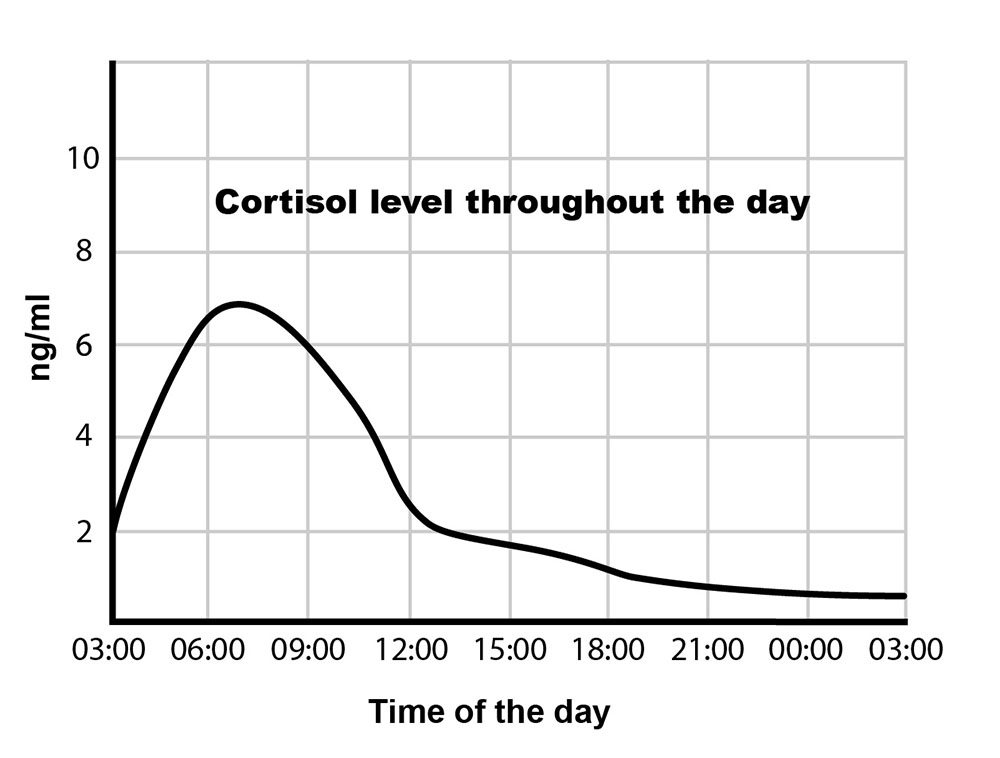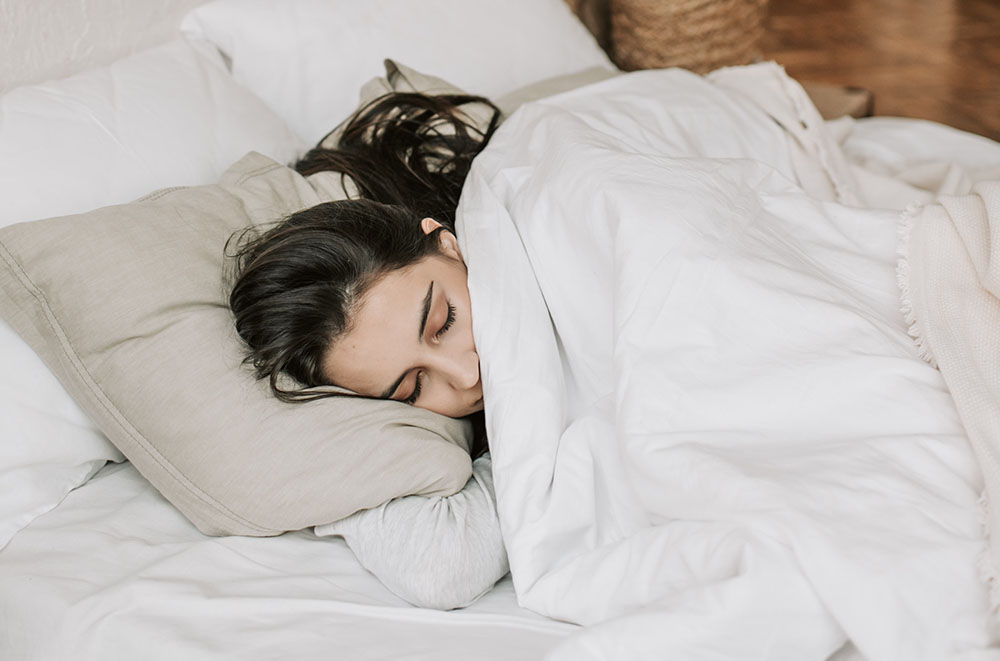No matter what time you go to bed, the following three things need to happen inside you to be able to fall asleep rapidly and sleep well:
1. Your nervous system has to enter a deeply relaxed state with the right neurochemical balance in your body and mind.
2. Your body needs to be sufficiently free from accumulated physical stress.
3. Your conscious thinking has to be guided into a ‘funnel’ that leads you to dreamland.
1. Creating The Right Neurochemical Balance in Your Nervous System

You probably know the feeling when you’re deeply tired and fall asleep in seconds. This neurological state is created by a ‘cocktail’ of neurochemicals, which is completely different from the ‘cocktail’ that keeps you actively awake. Most of the time, you enter this state naturally at the end of the day. However, this doesn’t always happen completely, which can make it difficult for you to fall asleep easily when you go to bed, or if you woke up at night for some reason. Fortunately, there are a couple of simple exercises described below that you can apply to release the neurochemicals in yourself that will help you fall asleep and remove those that keep you awake.
2. The Importance of Removing Accumulated Physical Stress From Your Body
There is no difference between mental and physical stress for your nervous system. Therefore, any form of physical tension in your body, even if it’s so light that you cannot directly feel it, can keep you awake. In our modern daily lives, we often misuse our bodies by spending too much time in static positions. This can lead to muscle stiffness in different parts of your body. If you go to bed without removing that stiffness, you may have difficulty falling asleep, and it can negatively affect the quality of your sleep. You might also wake up in the middle of the night feeling tense and restless, as this stiffness can intensify during the night instead of dissolving.

It may also happen that you do not feel muscle pain or notice the stiffness in your body itself, which is called latent physical stress. In such cases, you may have absolutely no idea what’s really going on, but those are the times when you are turning around again and again in your bed without finding any comfortable position to fall asleep.
Not only the lack of physical activity but the opposite, overexercising during sports, can lead to similar stiffness. By removing the accumulated stiffness and tension from your body using the methods suggested below, you will not only fall asleep easier, but your sleep quality can also dramatically improve. You will be much fresher and energetic throughout your days.
3. Guiding Your Conscious Thinking Into a ‘Funnel’ Leading to Dreamland

If you are thinking about exciting, worrying, or annoying things, your subconscious brain will keep you awake. If this happens to you, don’t try to stop your thinking. It is impossible. You will probably fail, and that frustration will only keep you awake even longer. Instead, start thinking in a way that can stimulate your subconscious brain to make you fall asleep. Certainly, this is the most challenging part of mastering the process of falling asleep because many of our thinking patterns that can keep us awake are getting strongly wired in our brains. It takes some practicing to learn to think differently, especially when negative thoughts unwillingly keep popping up in your mind. However, if you know the right thinking exercises, like the ones below, and you keep practicing them, you will become better and better at channeling your thoughts in a direction that will help you easily fall asleep at any time.
8 Simple Practices to Meet All Three Requirements for Falling Asleep Easily and Having A Quality Bedtime
1. Do 15-20 minutes of stretching exercises before going to bed to release the tension accumulated in your body throughout the day. Besides removing physical tension, stretching exercises also release neurochemicals like serotonin and oxytocin in your nervous system. Serotonin makes you feel comfortable and content, and it is the neurochemical that transforms into melatonin in your brain, the hormone that eventually puts you to sleep. Oxytocin is also referred to as the ‘hugging’ hormone reduces stress and can contribute to your warm and relaxed feelings. If you observe yourself while joyfully stretching your body, you experience warm feelings very similar to being hugged. Stretching, therefore, is actually also a way of hugging yourself with all its positive neurological benefits.

In addition to stretching, self-massage by rolling your back over a yoga foam roller is also excellent for removing accumulated tension from your body. This technique works especially well because it has strong direct effects on your spinal cord, which is one of the most important neural pathways to your brain.
Not only before going to bed, but also when you wake up in the middle of the night and have difficulties with falling back asleep, it can help you a lot to do some stretching exercises or a short self-massage. It is better to get out of bed at night for 15 minutes and easily fall back asleep than to just turn around restlessly and sleep shallowly.
2. Induce a deep state of relaxation in your nervous system through breathing exercises such as square breathing or the 4-7-8 method. These exercises immediately release neurochemicals like acetylcholine, GABA, and serotonin into your brain and body, lowering your heart rate, reducing the activity of stress hormones, and bringing your nervous system to the brink of falling asleep. When it comes to bringing your nervous system to the brink of sleep, nothing beats the method of activating the so-called ‘diving response’ in yourself. By practicing to enter and descend deeper and deeper into this neurological state, you can create the effect of the most powerful sleeping pills in your mind and body, naturally, without any side effects.
3. Start thinking exercises to prevent thoughts that induce stress or excitement. Counting sheep or counting down from 100 to zero are good thinking exercises to guide your brain to sleep because neither sheep nor numbers evoke emotions that would keep you awake. Any other thinking exercises with similar objectives work just as well.
4. Anchor your attention to the joy of breathing. This most simple form of meditation is a great exercise to tame your restless thinking. If your thoughts start to drift away, gently guide your attention back to your breathing. Enjoy the fresh air streaming into your lungs and the relaxation that comes with the sensation of breathing out. You can combine this exercise with the previous if you start counting your breaths. It will make it easier to keep your attention on your breathing.
5. Start dreaming while being awake. Imagine a beautiful dream filled with lovely, peaceful, and relaxing scenes. As you guide yourself through this dream, your subconscious will think you’re already asleep and it will help you enter a real sleep. This principle is similar to how telling bedtime stories to children works.
6. Stop willing to sleep. It can be difficult at first for some people, but this is one of the most powerful ‘mind hacks’ that can help you fall asleep when you can’t. If you find it frustrating that you can’t sleep, that frustration can become an irritation, keeping you awake all night. The best way to break this cycle is to practice surrender. Let it go. Think that you’re fine with not sleeping. Think that this will be your best sleepless night. It’s a bit challenging, but if you manage to do so, you’ll barely have sleepless nights anymore. If there is no need to sleep, the mental pressure on yourself dissolves, making it easy to fall asleep.
7. Try to sleep more during the period when your cortisol levels are low. Cortisol is the hormone that regulates glucose levels in your body, providing energy. It suppresses the working of melatonin, your sleeping hormone. Its levels follow a specific curve, rising sharply from around 3 am to peak at the time of waking up. Your nighttime recovery is much better when you sleep more during periods of low cortisol levels. This is why many sleep experts say that every extra hour of sleep before midnight counts double. However, going to bed earlier than 10 pm doesn’t seem to offer additional benefits anymore.

8. Lower your cortisol levels before going to bed. Although the stretching exercises and breathing exercises mentioned above can immediately reduce your cortisol levels, there is an even more powerful tool to do that. Intensive physical movement in the afternoon or evening, such as power exercises, running, or swimming, initially increases cortisol levels in your body to provide sufficient energy. However, this is followed by a rapid overall reduction in cortisol for many hours. With less cortisol in your blood at the end of the day, your melatonin levels will rise higher, making it much easier to fall asleep and have better sleep quality.
2 More Tips To Improve Your Sleep Quality
1. It is also important, as most people already know, not to eat heavy meals before bedtime that can cause discomfort and put your digestive system on hard work, in place of giving it rest and recovery time.
3. Do not forget to drink enough before going to bed. During a long sleep, you may easily become dehydrated, which can lower your sleep quality and make you feel tense upon waking. It’s better to drink before going to bed and learn how to fall back asleep quickly when you wake up to pee, rather than not drinking and getting dehydrated at night. If you go to the toilet at night, remind yourself that it is only good for you. It removes excess substances and toxins from your body, so your sleep after will be much better, especially if you drink a big glass of water for the remaining part of the night.
